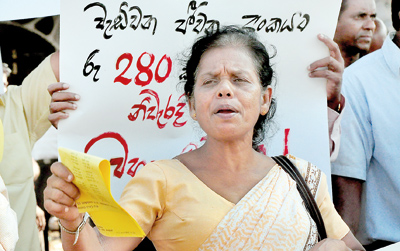News
Burdened by the skyrocketing cost of living public look for relief in Budget 2014
View(s):With the 2014 Budget round the corner, the public are hoping for relief from the high cost of living, by way of a salary increase or a reduction in the cost of essential goods. Some 35 Trade unions in a coalition representing all sectors, have submitted a petition of 18 demands to President Mahinda Rajapaksa, who is also the Finance Minister. One of the demands is a salary increase of Rs 10,000 for the State sector, and a further Rs 5,000 in the next Budget.

A protest in front of the Fort Railway Station on Thursday against rising cost of living. Pix by Mangala Weerasekera
The trade unions say that it is becoming increasingly hard to cope with the skyrocketing cost of living, while basic amenities such as water, electricity and bus fares have also increased. The minimum wage of a Government Sector employee is Rs 11,730, while that of a Private Sector employee is Rs 8,625. Although it was said that this would increase with the last Budget, it did not happen so, the trade unions allege.
Meanwhile, trade unions representing each sector have their own concerns, where the teachers’ trade union continues to demand a 6 per cent of GDP allocation for Education in the forthcoming Budget. While Health sector unions urge the government to allocate Rs 150 billion in order to manage its costs.
Meanwhile, Free Trade Zone unions say that salary issues for private and public sector employees must be solved through a Salary Commission. The Housewives Association urged a reduction in the prices of food items, as most of them are struggling to cope with the increasing prices of goods.
Health Sector Alliance President Saman Ratnapriya said that this sector has been allocated Rs 125 billion in the Appropriation Bill, which should be increased to at least Rs 150 billion.He said that the capacity of the State Pharmaceuticals Manufacturing Corporation should be increased and allocations made to manufacture drugs in Sri Lanka.
Ceylon Teachers Union General Secretary, Joseph Stalin said they would continue with their demand for a 6 per cent of GDP allocation for the Education sector. Free Trade Zone Workers Union President, Anton Marcus said that salary issues of employees should be through a Salary Commission, as decided in last year’s proposal. “At a meeting between the trade unions and the President held at Temple Trees, it was promised to implement the Salary Commission within two weeks, but never done,” he said.
Sri Lanka Housewives Association Joint Secretary, Diana Rishi said that there should be a reduction in prices of food items, as it is very difficult to balance the cost of living. “Prices of essential food items are increasing continuously. I think the prices of milk powder, gas and other items will increase in future too. If prices of food items do not reduce, it will be extremely difficult to bear the cost of essential items” she said.
Lanka Private Bus Owners Association President, Gemunu Wijeratne said that the Association wants the Government to reduce the VAT for prepaid card machines in buses. The Sunday Times also spoke to a cross section of people on their expectations from the forthcoming Budget. M.K. Naushad (51), a government employee from Kalutara, said that only a salary increase will save all government sector employees from the high cost of living, as the prices of goods have been increasing continuously.
“Authorities have stopped Housing Loan facilities and pay allowances in an irregular manner. The government keeps increasing the prices of goods, but never considers a basic salary increase. They should at least look into the increase in the forthcoming Budget,” he said.
S. Chandrasekaran, (50), a shoemaker and a father of three from Slave Island, said that his daily wage is just Rs 1,000, with which he has to meet the daily expenditures. “The prices of goods are very high” he said. Chandrasekaran said that he is heavily in debt, and his earning are not at all enough to support his family.
Chamila Thushari (42), a Private Sector employee and mother of three from Ja-ela, said that salary increases for Private Sector employees should be considered in the forthcoming Budget. Budgetary relief should be granted to people like her, as the salary packages are not reasonable in the Apparel Industry.
“We women who stay away from our families to work, will have to face many hidden costs, which cannot be fulfilled without a fair salary. Government should consider the income and expenditure issues of Private Sector employees and provide relief,” she said.


